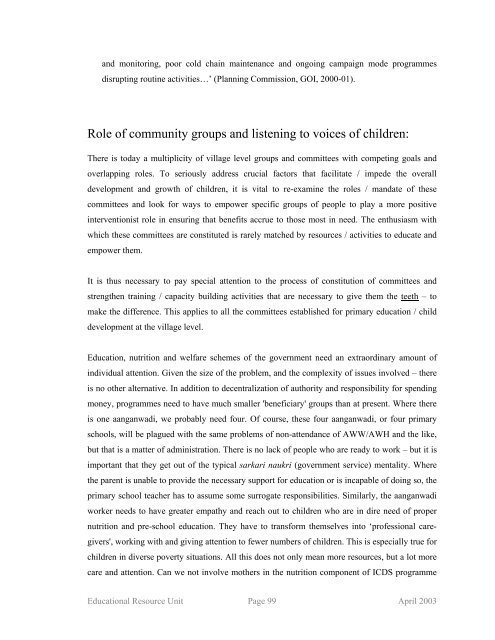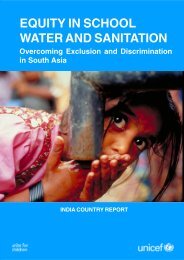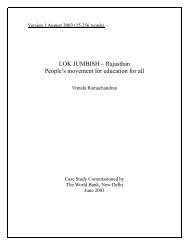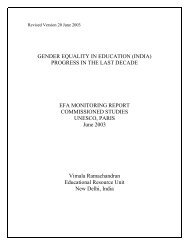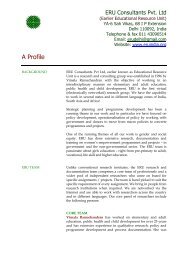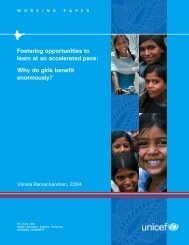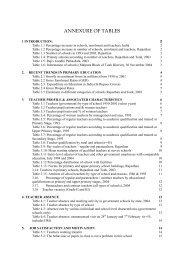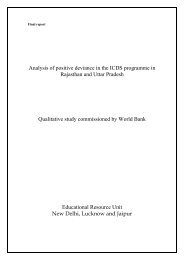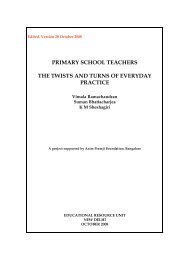Snakes and Ladders - ERU Consultants Pvt. Ltd.
Snakes and Ladders - ERU Consultants Pvt. Ltd.
Snakes and Ladders - ERU Consultants Pvt. Ltd.
Create successful ePaper yourself
Turn your PDF publications into a flip-book with our unique Google optimized e-Paper software.
<strong>and</strong> monitoring, poor cold chain maintenance <strong>and</strong> ongoing campaign mode programmes<br />
disrupting routine activities…’ (Planning Commission, GOI, 2000-01).<br />
Role of community groups <strong>and</strong> listening to voices of children:<br />
There is today a multiplicity of village level groups <strong>and</strong> committees with competing goals <strong>and</strong><br />
overlapping roles. To seriously address crucial factors that facilitate / impede the overall<br />
development <strong>and</strong> growth of children, it is vital to re-examine the roles / m<strong>and</strong>ate of these<br />
committees <strong>and</strong> look for ways to empower specific groups of people to play a more positive<br />
interventionist role in ensuring that benefits accrue to those most in need. The enthusiasm with<br />
which these committees are constituted is rarely matched by resources / activities to educate <strong>and</strong><br />
empower them.<br />
It is thus necessary to pay special attention to the process of constitution of committees <strong>and</strong><br />
strengthen training / capacity building activities that are necessary to give them the teeth – to<br />
make the difference. This applies to all the committees established for primary education / child<br />
development at the village level.<br />
Education, nutrition <strong>and</strong> welfare schemes of the government need an extraordinary amount of<br />
individual attention. Given the size of the problem, <strong>and</strong> the complexity of issues involved – there<br />
is no other alternative. In addition to decentralization of authority <strong>and</strong> responsibility for spending<br />
money, programmes need to have much smaller 'beneficiary' groups than at present. Where there<br />
is one aanganwadi, we probably need four. Of course, these four aanganwadi, or four primary<br />
schools, will be plagued with the same problems of non-attendance of AWW/AWH <strong>and</strong> the like,<br />
but that is a matter of administration. There is no lack of people who are ready to work – but it is<br />
important that they get out of the typical sarkari naukri (government service) mentality. Where<br />
the parent is unable to provide the necessary support for education or is incapable of doing so, the<br />
primary school teacher has to assume some surrogate responsibilities. Similarly, the aanganwadi<br />
worker needs to have greater empathy <strong>and</strong> reach out to children who are in dire need of proper<br />
nutrition <strong>and</strong> pre-school education. They have to transform themselves into ‘professional care-<br />
givers', working with <strong>and</strong> giving attention to fewer numbers of children. This is especially true for<br />
children in diverse poverty situations. All this does not only mean more resources, but a lot more<br />
care <strong>and</strong> attention. Can we not involve mothers in the nutrition component of ICDS programme<br />
Educational Resource Unit Page 99 April 2003


